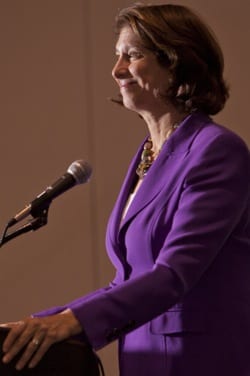Who is a member?
Our members are the local governments of Massachusetts and their elected and appointed leadership.
 Despite signing landmark health care legislation during his first term, President Barack Obama’s legacy will rest largely on how he navigates the government’s complicated fiscal landscape, according to National Public Radio correspondent Mara Liasson.
Despite signing landmark health care legislation during his first term, President Barack Obama’s legacy will rest largely on how he navigates the government’s complicated fiscal landscape, according to National Public Radio correspondent Mara Liasson.
Speaking at the closing session of the MMA Annual Meeting on Jan. 26, Liasson described the health care legislation that Obama signed in 2010 as the last of several major reforms that have been enacted over the past eight decades, starting with Social Security.
The president’s challenge in his second term, she said, rests primarily on his ability to forge a “grand bargain” with Republicans on spending, taxes and entitlements.
“Without a deal,” she said, “I don’t see how the president gets the revenue he wants to make the kind of investments he says are so important to the middle class, and for things like infrastructure and research, and for combatting poverty.”
Despite the avoidance of the so-called fiscal cliff at the beginning of January, other “little cliffs” are not far off, including what would be $110 billion in automatic spending cuts resulting from sequestration.
Liasson said the agreement by Republicans to allow the national debt ceiling to rise is an important tactical shift. The move shows that Republicans “were not willing to shoot the hostage,” she said.
“They were not willing to take the country into default, and that is exactly what the White House hoped would happen,” she said.
Other challenges loom, however, including the threat of a government shutdown in March, made possible by the stopgap funding measures that Congress has been relying on for years.
Citing fellow journalist Ezra Klein, Liasson noted that while Democrats have for the most part prevailed in debates over entitlements, Republicans have tended to win the arguments over not raising taxes.
“This is one of the key ingredients in our gridlock and dysfunction,” she said.
Liasson said the outlook for Congress breaking its gridlock and getting things done remains dim, in part because redistricting in many states has created strongly partisan – or “safe” – districts. As a result, most House members only have to worry about a challenge from within their own party, during a primary, so there is little incentive to move toward the center.
This means that many Republicans are less inclined to follow the lead of House Speaker John Boehner, she said. Only 4 percent of Democratic congressmen, meanwhile, come from a district that was carried by Mitt Romney last November.
“So the country is almost perfectly polarized,” Liasson said. “And that is one of the reasons why almost nothing can get done. Republicans and Democrats live in different universes.”